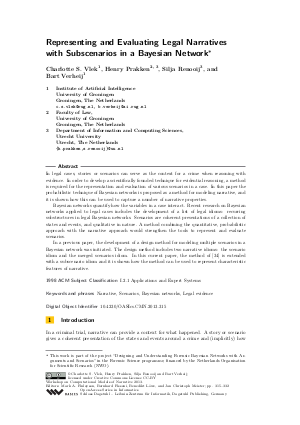Representing and Evaluating Legal Narratives with Subscenarios in a Bayesian Network
Authors Charlotte S. Vlek, Henry Prakken, Silja Renooij, Bart Verheij
-
Part of:
Volume:
2013 Workshop on Computational Models of Narrative (CMN 2013)
Part of: Series: Open Access Series in Informatics (OASIcs) - License:
 Creative Commons Attribution 3.0 Unported license
Creative Commons Attribution 3.0 Unported license
- Publication Date: 2013-08-02
File

PDF
OASIcs.CMN.2013.315.pdf
- Filesize: 2.54 MB
- 18 pages
Document Identifiers
Subject Classification
Keywords
- Narrative
- Scenarios
- Bayesian networks
- Legal evidence
Metrics
- Access Statistics
-
Total Accesses (updated on a weekly basis)
0Document
0Metadata
Abstract
In legal cases, stories or scenarios can serve as the context for a crime when reasoning with evidence. In order to develop a scientifically founded technique for evidential reasoning, a method is required for the representation and evaluation of various scenarios in a case. In this paper the probabilistic technique of Bayesian networks is proposed as a method for modeling narrative, and it is shown how this can be used to capture a number of narrative properties. Bayesian networks quantify how the variables in a case interact. Recent research on Bayesian networks applied to legal cases includes the development of a list of legal idioms: recurring substructures in legal Bayesian networks. Scenarios are coherent presentations of a collection of states and events, and qualitative in nature. A method combining the quantitative, probabilistic approach with the narrative approach would strengthen the tools to represent and evaluate scenarios. In a previous paper, the development of a design method for modeling multiple scenarios in a Bayesian network was initiated. The design method includes two narrative idioms: the scenario idiom and the merged scenarios idiom. In this current paper, the method of Vlek, et al. (2013) is extended with a subscenario idiom and it is shown how the method can be used to represent characteristic features of narrative.
Cite As Get BibTex
Charlotte S. Vlek, Henry Prakken, Silja Renooij, and Bart Verheij. Representing and Evaluating Legal Narratives with Subscenarios in a Bayesian Network. In 2013 Workshop on Computational Models of Narrative. Open Access Series in Informatics (OASIcs), Volume 32, pp. 315-332, Schloss Dagstuhl – Leibniz-Zentrum für Informatik (2013)
https://doi.org/10.4230/OASIcs.CMN.2013.315
BibTex
@InProceedings{vlek_et_al:OASIcs.CMN.2013.315,
author = {Vlek, Charlotte S. and Prakken, Henry and Renooij, Silja and Verheij, Bart},
title = {{Representing and Evaluating Legal Narratives with Subscenarios in a Bayesian Network}},
booktitle = {2013 Workshop on Computational Models of Narrative},
pages = {315--332},
series = {Open Access Series in Informatics (OASIcs)},
ISBN = {978-3-939897-57-6},
ISSN = {2190-6807},
year = {2013},
volume = {32},
editor = {Finlayson, Mark A. and Fisseni, Bernhard and L\"{o}we, Benedikt and Meister, Jan Christoph},
publisher = {Schloss Dagstuhl -- Leibniz-Zentrum f{\"u}r Informatik},
address = {Dagstuhl, Germany},
URL = {https://drops.dagstuhl.de/entities/document/10.4230/OASIcs.CMN.2013.315},
URN = {urn:nbn:de:0030-drops-41373},
doi = {10.4230/OASIcs.CMN.2013.315},
annote = {Keywords: Narrative, Scenarios, Bayesian networks, Legal evidence}
}
